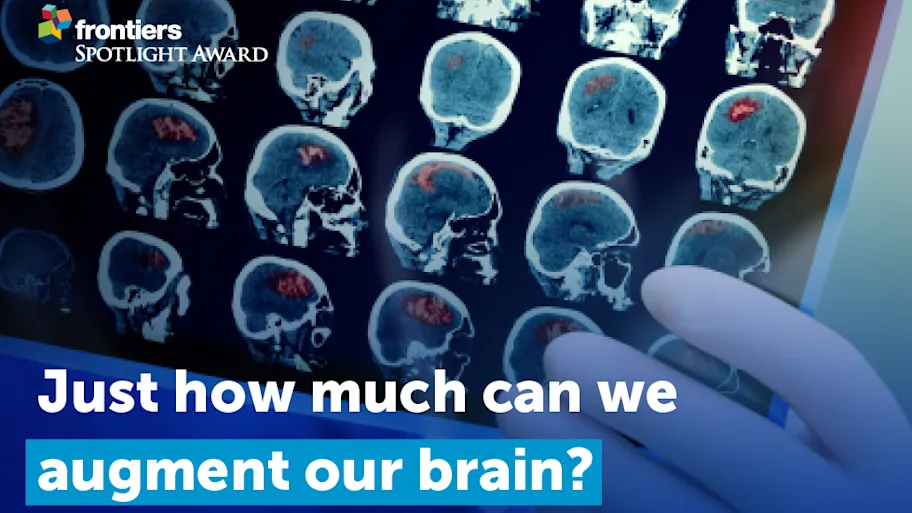A major new European research prize, the first annual Frontiers Spotlight Award 2017, has been awarded to the editors of an exceptional research collection, published in Frontiers in Neuroscience, on the augmentation of brain function. This research collection of almost 150 scientific articles covers all aspects of brain augmentation with notable implications and considerations for creating human super-intelligence.
As tech billionaires like Elon Musk and scientists like Stephen Hawking warn of an impending artificial intelligence arms race, a collection of groundbreaking new research into human super-intelligence and brain performance, has won a major new European research prize.
Led by prominent neuroscientists Dr Mikhail Lebedev from Duke University, Dr Ioan Opris a researcher at the University of Miami School of Medicine’s Miami Project to Cure Paralysis and Dr Manuel Casanova at the University of South Carolina School of Medicine, more than 600 authors contributed almost 150 research articles investigating brain augmentation – on everything from brain-machine interfaces, neurostimulators and the application of neuropharmacology.
Just a decade or two ago the idea of brain augmentation was reserved for science fiction but with the rapid development of neuroscience and related technological and medical fields, many of the past decade’s science fiction themes – sending information to the brain, reading out information from brain content, transferring simple memories from one brain to another, and adding artificial parts to the brain – are becoming real.
Duke University’s Dr Mikhail Lebedev said, “By 2030, augmentation of intelligence with brain implants will no longer be only the subject of research; people will have to deal with the reality of this new paradigm. This collection of research should alert scientists and the broader public to its possible ethical, medical, health and legal implications.”
In one research paper in the collection, Donor/recipient enhancement of memory in rat hippocampus, Dr Sam Deadwyler from the U.S. Wake Forest School of Medicine in North Carolina, and his colleagues, describe a donor-recipient memory transfer. In this incredible experiment, a donor rat performed a behavioral task requiring memorization. The memory content from the hippocampus of the donor rat was then decoded and, using electrical micro-stimulation, transferred to the hippocampus of another rat. After the donor rat’s neural activity was processed by a multiple-input multiple-output model, and delivered to the recipient’s brain, the recipient rat successfully reproduced the behavioral task as well as the donor rat that had learned it.
Another paper explores something that we all love – sleep! In the paper Sleep for cognitive enhancement, Dr Susanne Diekelmann from the Institute of Medical Psychology and Behavioral Neurobiology at the University of Tubingen in Germany reviews enhancing the potential of sleep for such cognitive functions as attention, language, reasoning, decision making, learning and memory. The article discusses the role of sleep in memory consolidation and the acquisition of new memories after sleep, the role of sleep-specific brain oscillations in these processes and neurotransmitters involved.
The University of Miami’s Dr Ioan Opris said, “You will be amazed by how much we will have advanced in 2030,” a sentiment echoed by South Carolina School of Medicine’s Dr Manuel Casanova, “There are as many possibilities as the imaginations of researchers. I think that nanotechnology, passive sympathetic resonance, photo-biomodulation and brainwave entrainment will modulate brain function in ways more effective and with less side effects than any present technique. There is also the new field of wearable electronics where intelligence could be conveyed to us through glasses or sewn devices.”
This winning Research Topic, Augmentation of brain function: facts, fiction and controversy, competed against nine other finalists. It received over 1 million views and downloads demonstrating the enormous scientific interest and social relevance of this area of research. Two other Research Topics received special mentions from the jury.
Microbiome interplay and control, published in Frontiers in Microbiology, edited by Christine Moissl-Eichinger, Medical University of Graz, Graz, Austria; Gabriele Berg, Graz University of Technology, Graz, Austria; Martin Grube, University of Graz, Graz, Austria, investigated microbiomes, the hidden world of microbes that cover us inside and out and that are silently shaping us and our environment. The other, Bridging the Gap Between Policy and Science in Assessing the Health Status of Marine Ecosystems, published in Frontiers in Marine Science, edited by Angel Borja, AZTI Pasaia, Pasaia, Spain; Michael Elliott, University of Hull, United Kingdom; Maria C Uyarra, AZTI Tecnalia, Spain; Jacob Carstensen, Aarhus University, Roskilde, Denmark; Marianna Mea, Jacobs University Bremen, Wien, Austria looked at what it would take to protect the oceans and save marine life that is disappearing at an alarming rate.
The jury drawn from Frontiers’ Editorial Boards chose the winning Research Topic, judging on international reach, subject novelty and coverage, interdisciplinary character, and academic excellence.
Frontier’s Executive Editor, Dr Frederick Fenter, said the US$100,000 Frontiers Spotlight Award will support the winners to organize an international scientific conference in 2018 around brain augmentation, “The conference will provide a forum to catalyze, inspire and mobilize the rest of the research community and start an open dialogue on the ethical and philosophical considerations around brain enhancement that will become very real and practical in the near future.”







